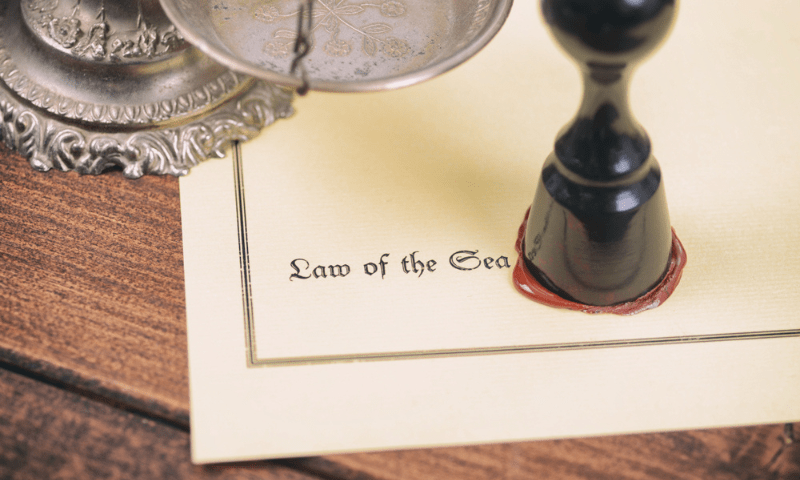Maritime Law

What is Maritime Law?
Maritime law, also known as admiralty law, comprises a set of legal principles governing activities on navigable waters. It encompasses regulations on shipping, navigation, and marine commerce, addressing matters such as safety standards, cargo transportation contracts, collision liability, salvage operations, and environmental protection. International agreements like the United Nations Convention on the Law of the Sea (UNCLOS) and conventions established by the International Maritime Organization (IMO) contribute to the framework of maritime law. Specialized admiralty courts handle disputes in this domain, ensuring a comprehensive legal framework for global maritime activities, trade, and environmental responsibility.
What is the scope of Maritime Law?
The scope of maritime law is broad and encompasses a wide range of issues related to activities on the seas and oceans. Here are some key aspects that fall within the scope of maritime law:
- Shipping and Navigation: Maritime law regulates the operation and navigation of ships, including issues such as ship registration, crew obligations, and safety standards.
- Marine Pollution: This aspect deals with regulations to prevent and address pollution of the oceans, including oil spills and other environmental hazards.
- Salvage and Towage: Maritime law governs the recovery of ships and cargo in distress, as well as the compensation for salvage efforts. Towage involves the towing of ships or other floating objects.
- Maritime Contracts: Contracts related to shipping, such as charter parties and bills of lading, fall under maritime law. These agreements define the terms of transportation, responsibilities, and liabilities of the parties involved.
- Maritime Liens: These are legal claims against a vessel or its cargo for services provided or damage caused. Maritime liens help ensure that those who provide goods or services to a ship are compensated.
- Maritime Personal Injury: This area addresses injuries or accidents that occur at sea, including those involving passengers, crew members, or other individuals on board.
- Carriage of Goods: Maritime law regulates the transportation of goods by sea, ensuring proper handling, documentation, and liability for any damage or loss.
- Maritime Insurance: Insurance related to maritime activities, such as hull insurance, cargo insurance, and protection and indemnity (P&I) insurance, is governed by maritime law.
- Admiralty Jurisdiction: This refers to the authority of courts to hear and decide maritime cases. Admiralty jurisdiction allows for specialized handling of maritime disputes.
- International Conventions and Treaties: Maritime law involves adherence to international agreements and conventions, such as the United Nations Convention on the Law of the Sea (UNCLOS), which establishes the legal framework for the use of the world's oceans.
The list is endless and we could go on and on
What are the various designations or roles a mariner can pursue?
In the maritime law sector, there are various designations and roles that mariners can pursue, combining their expertise in navigation and maritime operations with legal knowledge. Here are some common designations and roles within the maritime law sector:
- Maritime Lawyer or Maritime Attorney:
- Description: Maritime lawyers specialize in the legal aspects of maritime activities. They provide legal advice and representation to shipowners, operators, insurers, and other stakeholders in the maritime industry.
- Responsibilities: Handling legal cases related to maritime disputes, contracts, environmental regulations, and other issues. Providing legal counsel on matters such as vessel transactions, maritime finance, and compliance with international conventions.
- Maritime Arbitrator or Mediator:
- Description: Maritime arbitrators or mediators play a key role in resolving disputes through alternative dispute resolution methods, such as arbitration or mediation. They facilitate negotiations between parties involved in maritime conflicts.
- Responsibilities: Conducting arbitration proceedings, mediating disputes, and rendering decisions or recommendations to resolve conflicts outside of traditional court settings.
- Maritime Claims Adjuster:
- Description: Maritime claims adjusters assess and evaluate claims arising from maritime incidents, such as accidents, collisions, or cargo damage. They work for insurance companies or third-party adjusters.
- Responsibilities: Investigating and assessing the extent of damages, negotiating settlements, and ensuring compliance with insurance policies and maritime laws.
- Maritime Compliance Officer:
- Description: Maritime compliance officers ensure that maritime operations comply with national and international regulations. They work for shipping companies, port authorities, or regulatory bodies.
- Responsibilities: Monitoring and enforcing compliance with safety, environmental, and operational regulations. Conducting audits and inspections to ensure adherence to legal standards.
- Maritime Safety Inspector:
- Description: Maritime safety inspectors focus on ensuring the safety and security of maritime operations. They may work for government agencies responsible for maritime safety and inspection.
- Responsibilities: Inspecting vessels for compliance with safety regulations, conducting audits, and promoting adherence to international safety standards.
- Maritime Legal Consultant:
- Description: Maritime legal consultants provide expert advice on legal matters related to maritime operations. They may work independently or as part of legal firms, offering specialized consulting services.
- Responsibilities: Offering guidance on legal issues, contracts, and compliance. Assisting clients with legal strategies to navigate the complexities of maritime law.
- Maritime Compliance Manager:
- Description: Maritime compliance managers oversee and manage the compliance functions within shipping companies or maritime organizations. They ensure that operations align with legal requirements.
- Responsibilities: Developing and implementing compliance programs, conducting risk assessments, and collaborating with legal teams to address regulatory issues.
These roles represent a blend of maritime expertise and legal knowledge, allowing mariners to transition into positions where they contribute to the legal and regulatory aspects of the maritime industry.
Is Maritime law useful and good career option?
Maritime law presents a compelling and promising career path for those intrigued by both the maritime industry and legal field. Its global significance in facilitating international trade and overseeing maritime activities offers diverse opportunities, including roles like maritime lawyers, arbitrators, and claims adjusters. The continuous demand for legal professionals well-versed in maritime law, coupled with international opportunities and an interdisciplinary nature that combines law, navigation, and business, underscores the field's importance. Specialized knowledge is highly valued as regulations evolve, providing challenging and intellectually stimulating work, especially in handling complex legal issues related to shipping accidents and environmental concerns.
Career progression is achievable, leading to leadership roles such as law firm partners or heads of legal departments in maritime companies. While dedication to ongoing education and practical experience is essential, a career in maritime law can be immensely rewarding for those passionate about the industry and committed to professional development.
Which country is best for Maritime Law?
The United Kingdom (UK) is widely regarded as a premier destination for maritime law, driven by its rich maritime history and influential legal system. With a well-established legal framework rooted in centuries of trade and exploration, English maritime law is globally recognized for its clarity and predictability. London, a major hub for maritime arbitration, hosts respected institutions like the LMAA, making it a preferred venue for resolving maritime disputes. The city is home to leading international law firms specializing in maritime matters, while the UK's influence on global maritime conventions, its pivotal role in the maritime insurance market through Lloyd's of London, and its reputable educational institutions further solidify its standing. English as a global business language, coupled with London's status as a global maritime hub, enhances its appeal for professionals and organizations involved in the maritime industry. Overall, the UK's unique combination of historical significance, legal expertise, arbitration prominence, and global influence positions it as a top choice for those aspiring to build a career in maritime law.
For more details about the Opportunities in Maritime Law and to get expert guidance, Check out this video. This video discusses
a) Opportunities in the maritime law space for persons with sailing background
b) What kind of personality is required
c) How can a person plan for a career in this field?
d) Which colleges could be considered and the preferred geography
e) Advice for persons who are looking to make a career and a lot more details
In addition, check out the top UK universities like Swansea and Southampton to begin you Maritime Law venture. For further clarification or incase of any query, you can connect to our education counsellors on education@seaandbeyond.com or call/whatsapp on +91 8928896420 or +91 9326970603 or can write to us in comment section.
You could also connect with our experts Capt. Amarinder Singh Brar for any counseling as well
Note: Sea and Beyond doesn't charge any fees for counselling or admission in any of this college. We will help you take a well informed professional decision.

Sea and Beyond
At Sea and Beyond we strive for authenticity and honesty in our work. Our mission is to help “You take a well informed decision” and we try and support you through our various services like
- Mentoring
- Skill enhancement/Education
- Job Opportunities and
- Your branding (CV and LinkedIn preparation)
We have a team of writers who conduct thorough research to ensure the accuracy of the content and for the clarity in communication. We will be happy to support you wherever required
Leave a comment
View more
Give your career a boost with S&B professional services.
CV Prep/EvaluationMore Jobs
Ship management
Mumbai
Electrical Superintendent
Ports and Pilotage
Mombasa, Kenya
AGM / DGM
Agency and Logistics
Dubai
Director Operations
Interview Prep/Mentoring
Find your polestar with the host of experts available on our platform
Know more

